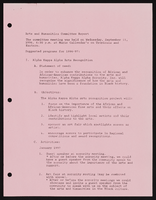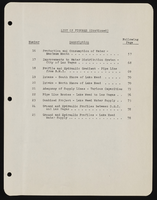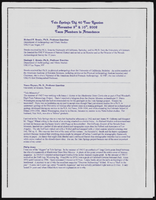Search the Special Collections and Archives Portal
Search Results

Alpha Kappa Alpha Sorority, Theta Theta Omega Chapter calendar
Date
Archival Collection
Description
From the Alpha Kappa Alpha Sorority, Incorporated, Theta Theta Omega Chapter Records (MS-01014) -- Chapter records file.
Text

Alpha Kappa Alpha Sorority, Theta Theta Omega Chapter arts and humanities committee report
Date
Archival Collection
Description
From the Alpha Kappa Alpha Sorority, Incorporated, Theta Theta Omega Chapter Records (MS-01014) -- Chapter records file.
Text
JMA Architecture Studio Records
Identifier
Abstract
The JMA Architecture Studio Records are comprised of architectural records (1953-2002) created by the American architect Jack Miller and/or his architectural firm, known as both Jack Miller & Associates, Architects, & Engineers, Inc and JMA Architects, Inc. This collection includes 30.25 linear feet of materials documenting work on over 250 projects. The collection focuses on Las Vegas and Reno, Nevada. The materials feature photographs of the firm’s projects and hand-drawn architectural drawings, ranging from pencil and ink on tracing paper preliminary sketches to ink on Mylar (TM) construction documents. The drawings also contain work from a number of consultants, engineers, and other architects who collaborated on the development of the various projects. The collection includes architectural drawings for hotels, casinos, integrated casino resorts, office towers, multi-family residential developments, and custom single-family homes.
Archival Collection

Transcript of interview with Rochelle Hornsby by Barbara Tabach, November 30, 2016
Date
Archival Collection
Description
Rochelle (nee Winnick) Hornsby was born in New York in 1937. Her father was a scrapyard and auto parts dealer and her mother was a homemaker. She has one brother, Roy Winnick. After high school, Rochelle attended the prestigious Fashion Institute of Technology and then accepted a position with a T-shirt manufacturer. During this experience, she discovered her inspirational talent as a sales person. When she married her former husband, Len Hornsby, she followed him in his successful sales career. When his job moved him westward, they lived briefly in Beverly Hills, California. Soon Len saw a better career fit in Las Vegas in radio ad sales for radio. The next step was to take him into sales and management positions at the Las Vegas Convention and Visitors Authority. Meanwhile, Rochelle enjoyed getting involved with the Jewish community, volunteering with the Temple Beth Sholom Sisterhood, playing tennis, and starting her own business furnishing models for conventions. In this oral history, Rochelle shares stories of her various jobs in Las Vegas and of eventually thriving as a real estate agent with Century 21, a company that she continues to work for at the time of this interview. She and Len had one child, Even Scot Hornsby.
Text



